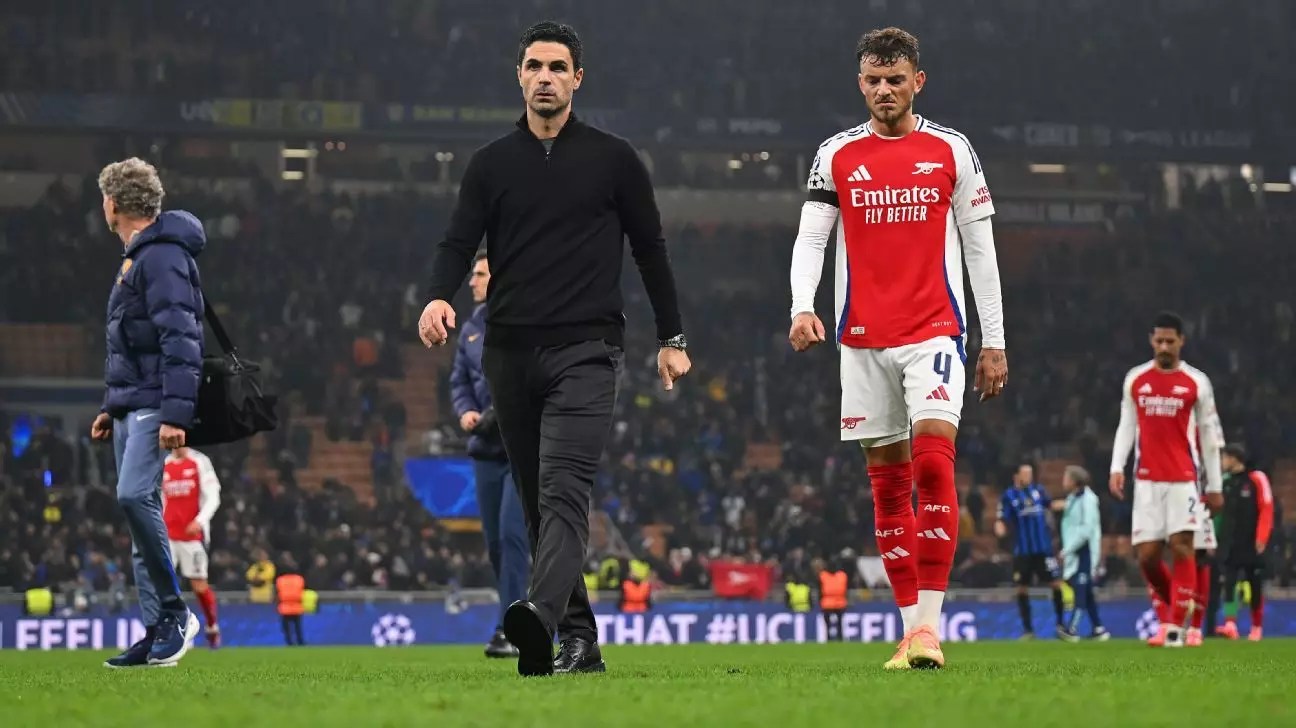Arsenal Football Club is navigating turbulent waters, and the recent 1-0 loss to Internazionale at San Siro has magnified the uncertainty surrounding the club. While this defeat does not spell doom for their UEFA Champions League ambitions, it casts a shadow over their aspirations for a top-eight finish, which is critical for automatic qualification in future European competitions. The precarious nature of their standing exacerbated an already troubling week marked by the sudden resignation of sporting director Edu Gaspar, casting doubt over the club’s future strategies and governance. To add to the worries, Arsenal finds itself seven points adrift of Premier League leaders Liverpool, highlighting concerns about its robustness in the title race.
Arteta’s resilient leadership has underpinned Arsenal’s performance over the past two years, but recent events challenge the perception of stability that the club has cultivated. Injuries have taken a toll, disrupting the team’s rhythm and performance. Manager Mikel Arteta’s visible frustration during the match against Inter was an illustration of this growing turmoil. Controversial officiating decisions compounded Arsenal’s woes, particularly surrounding Mikel Merino’s involvement in two pivotal moments that swung fate in Inter’s favor. A denied penalty against Sommer raised questions about VAR’s interpretation of the rules, while Merino’s handball led to a spot-kick for Inter’s Hakan Çalhanoglu, unraveling Arsenal’s chance for a comeback.
The Need for Cutting Edge
Despite holding the vast majority of possession against their Italian opponents, Arsenal struggled to turn that control into tangible opportunities. Their efforts were largely thwarted by Inter’s sturdy defense, which allowed them only a solitary shot in the second half. Arsenal attempted to break through with increasingly desperate crosses—46 in total—but the lack of a cutting edge in the final third was apparent as they failed to capitalize on set-pieces. The performance, while improved from their recent defeat against Newcastle United, was plagued by predictability, suggesting that a deeper malaise might be affecting their attacking strategy.
Arteta’s post-match comments indicate hope without sound justification. While he praised his squad’s overall play, declaring it one of their best performances in Europe in recent years, such assertions stretch credulity. The stark reality is that too many key players are underperforming, with none capturing attention more than Gabriel Martinelli and Kai Havertz. Martinelli looked subdued, struggling to influence the game, while Havertz’s continued drift from the bustling midfielder Arsenal hoped to sign has raised eyebrows. The whispers around the club’s failure to strengthen its attacking options during the summer transfer window will likely grow louder in the wake of these challenges.
The return of Martin Ødegaard, who recently recovered from a prolonged ankle injury, may provide a flicker of hope. However, it is unrealistic to expect him to seamlessly reintegrate into a team that has begun to falter. His introduction late in the game did little to shift the balance and signaled the desperation surrounding the club as they grapple for a remedy to their scoring woes. Furthermore, Ødegaard’s integration was ironically prompted by a head injury sustained by Havertz, underlining an already thinning squad in critical moments.
Future Implications and Upcoming Challenges
The road ahead appears fraught with challenges for Arsenal, particularly as they prepare to face Chelsea at Stamford Bridge, a match crucial for both the Premier League standings and the players’ morale. Arteta’s optimistic assurance of a turnaround indicates a commitment to his vision, but the glaring need for improvement must be addressed. The emerging question is whether Arsenal can transform their performance before the uncertainty evolves into an untenable crisis.
If they manage to harness their possession and translate it into goals, there remains a pathway back to their winning ways. Nonetheless, they currently sit with three losses in their last six fixtures, and the pressure mounts with each successive setback. Navigating through these challenges requires not only tactical adjustments but also fortified mental fortitude. The psychological impact of these defeats cannot be overstated; if the team allows uncertainty to seep into their performances, it may lead to a season that dwindles well below expectations.
Arsenal finds itself at a critical juncture where decisions made today will shape their trajectory in the coming months. The blend of hope and uncertainty that currently pervades the Emirates requires immediate action and reflection. Resilient leadership and a well-crafted strategy will be pivotal in steering this storied club back to its rightful place among Europe’s elite contenders.


Leave a Reply